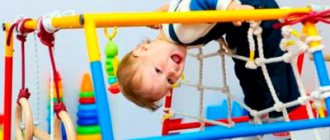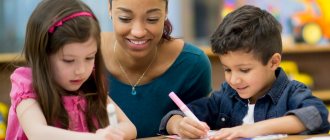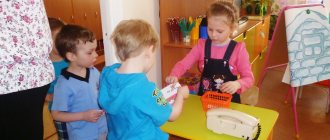Game-based learning
Communicative development in preschoolers occurs during play. It is very important that the gameplay is beneficial and helps develop the necessary skills. During the game, the child learns to understand the underlying motives of behavior and masters basic human communication skills.
Games should be varied and diverse: this contributes to the development of a harmonious personality that will successfully navigate social interaction.
To develop social and communication skills in preschool children, you can use the following gaming techniques:
Act out scenes from fairy tales. In this case, you can either use toys or turn into actors for a while. For example, you can act out the plots of Russian folk tales: they are quite instructive and provide a lot of food for discussion and thought. After the game, be sure to discuss with your child why the characters behaved in a certain way, for example, did not listen to their elders, and what consequences such behavior led to.
Offer your child different situations to discuss. For example, ask him what he would do if he wanted other guys to accept him into their game. Discuss several options for behavior, arrange small impromptu “role-playing games”. Let the child tell you how to behave in such a case, and how not to.
The following exercise is suitable for developing empathy. Invite your child to imagine that he is in a magic store, in which you will play the role of the seller. Let the child choose gifts for his relatives and friends. It could be anything: from a new car to a bouquet of flowers. The main thing is to ask the child to motivate his choice. This game will help you develop a very important skill: the ability to step into another person's shoes and imagine their needs and expectations.
Advice: try not to raise your voice at your child. Any situation can be resolved peacefully: it is important that the child knows how to negotiate, and not get his way by force.
Effective communication development - the basics
Every person knows how to communicate in one form or another from a very early age. When a baby cries, trying to attract the attention of his mother, he is already communicating and interacting socially with other people. However, this is not enough to achieve success. It is important that the child knows how to effectively communicate with other people.
Psychologists say that successful communication consists of several factors:
- Desire to communicate. Without motivation, effective communication is impossible. For example, everyone knows about a disease such as autism. Many autistic people do not have intellectual problems: they simply do not have the motivation to let other people into their inner world. Although psychologically developed, they are not socially developed.
- The ability to hear and listen to the interlocutor. It is important to be interested in other people and understand their messages.
- Emotional interaction. Without empathy and compassion, effective communication is impossible.
- Ability to communicate rules. There are certain unwritten norms of communication that may differ in different societies. The child must master these norms, otherwise he will have inevitable difficulties in the future. For example, one of the norms of communication is the need to be polite. If a child ignores this rule, he will be known as a rude person.
Advice: if you don’t want your child to have difficulties communicating with others, limit his “relationship” with a computer, TV or tablet.
When interacting with these devices, the child passively perceives information, and this is not enough for effective communication. It has been proven that children who play computer games too often from early childhood speak worse and have difficulty understanding the emotional reactions of others.
How to develop nonverbal communication skills?
Effective communication is unthinkable without developed nonverbal communication skills. It is important to be able to show a certain artistry in order to convey your thoughts and emotions to the people around you. Simple exercises will help you develop nonverbal communication skills:
- introduce the tradition of home theater productions. You can use finger puppets or paper figurines for your performances. Let the child learn to express the character’s emotions through intonation, rate of speech and other “tools”;
- Ask your child to show how the characters from his favorite fairy tales sit, walk or run. Let him depict how the cunning Fox, the naive Kolobok, and the evil Wolf move;
- A game called “The Sea Is Worried Once” helps develop non-verbal communication skills perfectly. By portraying various characters, the child learns to get used to their roles, thereby developing his ability to empathy and compassion;
- ask the child to imagine that Princess Nesmeyana is in front of him. Let him try to make her laugh without resorting to speech. The role of Princess Nesmeyana can be played by a doll, an older sister, or even the baby’s mother.
Advice: It is interesting that the best development of communication abilities in preschool children occurs if they participate in sports sections from an early age.
Children in such sections not only get rid of muscle stiffness, but also interact with peers. Therefore, if you want your child to grow up to be a sociable person, try to determine which sport is most interesting to him. This could be dancing, swimming, children's gymnastics, etc. The main thing is to choose an activity that brings joy to the child.
Family influence on the communication skills of a preschooler
The family is the most significant social structure for young children, where communication skills with others are formed. In order for a child to understand the importance of social interaction and acquire effective communication skills, the following rules should be followed:
- Set a positive example. If parents talk to each other in front of the child, and do not each do their own thing, the baby will actively follow the example of mom and dad.
- Talk to your child. Even recently born children respond to speech addressed to them. Parents should contact the baby, comment on their actions, and read fairy tales aloud. When a child learns to talk, it is very important to discuss with him the impressions received during the day, ask questions that require a detailed answer, etc. The latter is very important: parents must learn to formulate questions in such a way that the child cannot limit himself to simple answers like “yes.” " or not".
- Read fairy tales to your child, followed by a discussion of the motives behind the characters’ behavior. Ask as many questions as possible: “Why did the hero behave in a certain way?”, “Why did the hero fail to achieve his goal?”, “What would you do if you were the character?” etc..
- Encourage your child to socialize with peers. Developmental groups, playgrounds and children's clubs contribute to the rapid development of communication skills. Isolation of a child can cause serious problems with adaptation to a team in the future;
- Do not try to fulfill the child’s “non-verbal” requests. Give him the opportunity to explain what he wants. Many parents try to anticipate the child's needs before he has time to utter a word. This greatly inhibits communicative development: let the baby tell you what he wants. In the early stages, it can be one word, for example, “water”, “doll”, “ball”. When the child masters speech better, teach him to formulate detailed requests to others.
- Gently explain that some forms of communication behavior are socially unacceptable. For example, if a child demands to give him a toy without saying “please,” say that this is impolite.
Tip: When reading, choose fairy tales and stories whose characters interact with each other. This will allow the child to better master communication skills.





